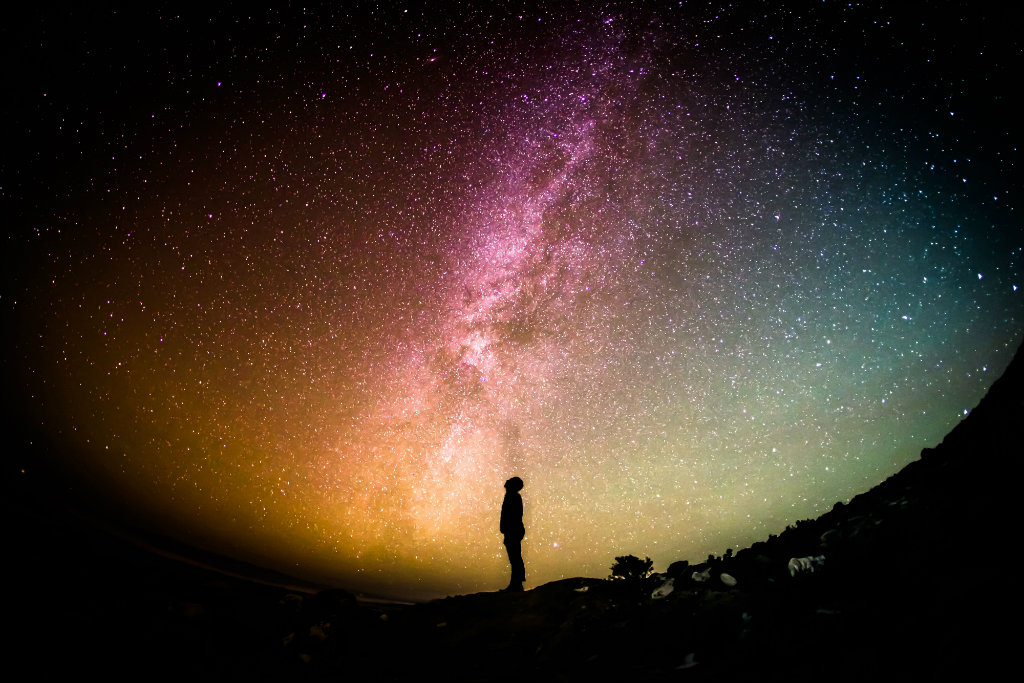by Timothy Pauls
In a rather disconcerting turn of events, physicists at the CERN laboratory in Switzerland (i.e., really smart physicists) have concluded that the universe should have destroyed itself at the moment it came into existence.
The universe consists of both matter and antimatter, each opposing the other, as I know full well from my years of watching Star Trek, which also happens to be my best scientific credential for writing this article. Matter and antimatter do not get along with each other. Take a mixing bowl, add one cup each of matter and antimatter along with a dash of paprika, and they will “annihilate” each other in a “burst of pure energy,” a reaction which may or may not smell faintly of paprika.
Scientists have thus pondered this question: if the universe consists of both matter and antimatter, why are we still here? Why have we not disappeared in a rather large burst of annihilating energy, paprika and all? How can both continue to exist in equal measures, yet with matter continuing to keep the upper hand?
The working hypothesis is that there must be some difference between the two that keeps them apart. CERN physicists have thus carefully tested matter and antimatter, trying to determine what sets them apart in terms of mass, electric charge, taste in Netflix miniseries and, most recently, magnetic field.
Years of the most exacting research have revealed that — get this — matter and antimatter enjoy perfect symmetry. In a creation that can barely manage a straight line on its own, matter and antimatter are completely symmetrical! There is apparently nothing (nothing we have yet discovered, at least) preventing the two from interacting quickly in a burst of energy that destroys everything, an event which should by rights have happened as soon as the universe came into being.
Physicists thus conclude that we shouldn’t be here, although they will undoubtedly continue to search for the asymmetry that they believe to be the answer. In the meantime, my mind is fraught with several other conclusions:
- Perhaps Douglas Adams was onto something when he suggested that the universe has been replaced by “something even more bizarre and inexplicable.” I am sometimes very sympathetic to this idea, usually on Wednesdays. I never can get the hang of Wednesdays.
- Given the improbability of this universe existing, one who limits himself to science and chance might well conclude that it must have taken a bazillion universes trying to come into being before this one survived, kind of along the lines of the old adage, “If you give a million monkeys a million typewriters, one of them will like my sermon.”
- Maybe that six-year-old who annoys us by repeatedly saying, “It’s opposite day,” actually knows something we don’t and should be taken very, very seriously.
Or we might take a moment to consider these words:
For by him all things were created, in heaven and on earth, visible and invisible, whether thrones or dominions or rulers or authorities — all things were created through Him and for Him. And He is before all things, and in Him all things hold together. (Col. 1:16-17)
In Christ, all things hold together.
Obviously, the existence of a creation implies the existence of a Creator. Would it not also follow that, if the universe remains when it should have annihilated itself, that the aforementioned Creator is also holding it together? Like creation itself, its continued preservation implies that God is continually at work.
Specifically, Christ is at work, which is all the more reason for wonder! The One for whom holding the universe together is no big thing became flesh. God and man are held together in one! That’s a mystery far greater than the coexistence of matter and antimatter. (And as long as we’re talking about mysteries … if it’s no big thing for Christ to hold matter and antimatter together, are we really going to wonder if He is present with His body and blood in the Holy Communion? Really?)
And why did God become man? To redeem you from your sin. The One who holds all things together died and rose for you, forgives you, knows your name and says, “I baptize you, that you might be my child forever.”
Forever. The “burst of pure energy” sounds not unlike the fervent heat of the Last Day (2 Peter 3:12). Someday, the universe will end. You, on the other hand? The one who holds the universe together doesn’t just hold you together. He has recreated you. In Christ, you’re going to live forever.
Pastor Tim Pauls serves at Good Shepherd Lutheran Church in Boise, Idaho.






my scientific credentials go back to “Flash Gordon” and I can verify that this is a great article.
When a high-profile Christian scientist spoke at my university, he recognized with awe the intelligence evident in Creation. But he also admonished his largely Christian audience to resist a tendency toward belief in a “God of the gaps,” which involves simply attributing to orchestration by God whatever lies beyond what can be explained by today’s science.
That science has not found a mechanism that explains how the universe was perpetuated from the beginning of time despite the perfect symmetry between matter and antimatter is not a good reason to say simplistically, “It’s God’s power!” What kind of world would we live in today if our understanding of the weather, disease, wildlife, crop growth, etc. ended with such an explanation?
Among notable physicists, Isaac Newton himself was deeply religious, intending that his writings on motion and planetary mechanics (Principia) would make a compelling case for believing in God. Likewise, a Christian scientist today can apply with integrity his or her talents to help us understand more deeply how God’s Creation works, recognizing that the mechanisms discovered by science are not substitutes for believing in God, but God’s mechanisms.